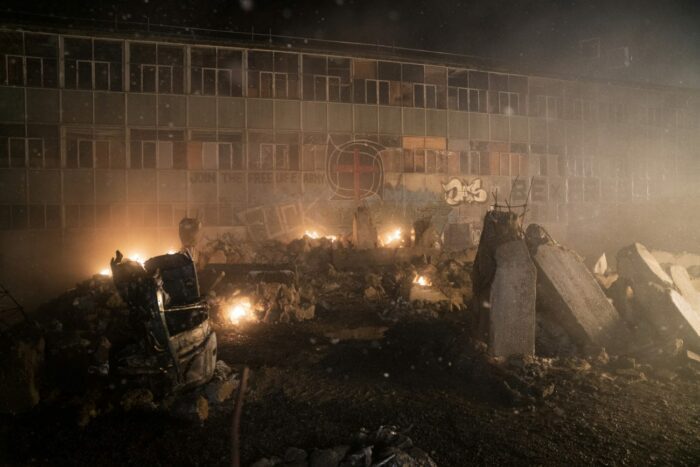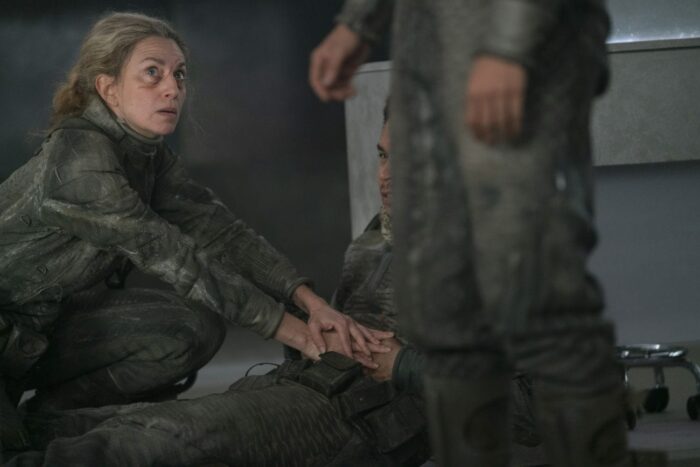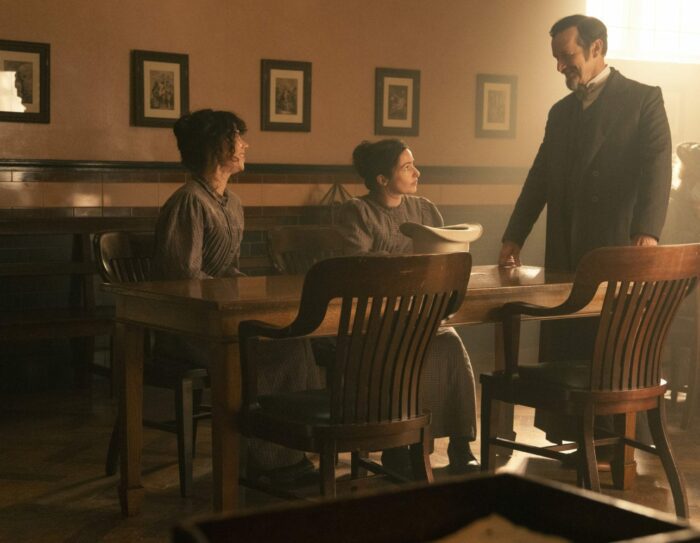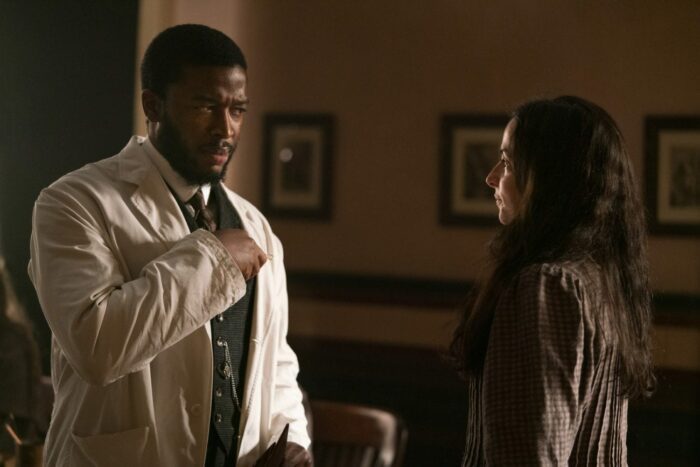The following contains spoilers for The Nevers S1E6, “True” (the Season 1A finale)
If you’ve been reading along each week, you’ll know that I’ve had some issues with the narrative structure of The Nevers along the way. I’m afraid I can’t quite say that with S1E6 (written by Jane Espenson and directed by Zetna Fuentes) all is forgiven, but the final episode of Season 1A (“True”) did do a lot to lessen my worries about the show overall. I still think the first five episodes of the series fall prey to a bit too much intentional obfuscation (and I might say that to some degree about S1E6 as well), but it’s at least now clear why this was the case. The writers of The Nevers were withholding so that the six episode arc could culminate with a finale that truly does do something distinctive when it comes to narrative form. It opens new and bigger questions while answering some of the smaller ones that have been lingering. That’s a structure I find thrilling. I just wish they’d pulled it off better, as so often along the way I felt less intrigued by diegetic mystery and more befuddled as to whether I was missing something.
But enough relitigating the past, let’s dig into the finale of the first part of The Nevers, which for some reason we are calling half a season instead of a full one that is six episodes long.

The Nevers S1E6 consists of three chapters. The first is titled “Stripe” and throws us into a post-apocalyptic future in a fashion that can only remind one of Dollhouse (if one has seen it). Numerous new characters are thrown at us in quick succession and they don’t even get names because, of course, names are sacred and there is something about them withholding their names from one another—a least there is when it comes to the PDC (Planetary Defense Coalition) folks. On the other side of the war are those who refer to themselves as Free Life, and that fellow is more than happy to shout his name to the rafters after he is taken prisoner.
It’s not at all clear when or how this conflict between Free Life and the PDC began, and the names of the two factions aren’t much clue. There is the idea that the Galanthi will save the world, but that’s from the PDC folks and it’s clear that the Free Life folks view the Galanthi as a threat. So the Planetary Defense Coalition is on the side of the aliens, which I suppose makes sense in an almost Orwellian sort of way, but were the Free Life people the cause of the threat to the planet in the first place? How so? Was it through insisting on the freedom to pollute and not care about global warming? That’s my wholly speculative suggestion, but I suppose their name could stem from a thought that the Galanthi are coming to rule the people of Earth or something like that. It’s really not spelled out. (I infer that these events do take place on Earth, however, from the reference to Edinburgh and things Amalia says later.)
This is an intriguing mystery and I look forward to The Nevers meting out small hints with regard to what happened to lead to this state of affairs over the course of time. Taking the structure of Dollhouse as a reference point, I can’t help but think that this will be the plan, with the end of the next arc of six episodes also giving us a taste of this post-apocalyptic future or what led to it. That’s my hope, anyway—I don’t expect anything before then.
As to the Galanthi, Amalia referred to them in S1E5 but there was so little context for her use of the word that I don’t think it even made my write-up. This is what her team was off in search of, though, or more specifically the one that came to London. But I’m getting ahead of myself insofar as that narrative arc gets picked up in the third chapter of S1E6.
We get a better glimpse of a Galanthi in the first chapter. Apparently they are kind of like giant cephalopods, or at least have tentacles coming from their heads, and they are the source of the spores. And when Amalia said something in S1E5 about saving the world, it is clear now that she meant saving the world from this calamitous future, somehow.
The Galanthi escapes and takes Stripe’s soul (for lack of a better term) with it, to be deposited into the body of one Molly True after she jumped into the lake in 1896 and committed suicide. So we’ve got an answer about her true face at last.

Chapter Two (“Molly”) gives us the life of Molly True, beginning before she took that surname through marriage. It was an unhappy marriage, her husband Thomas was an asshole, she had more than one miscarriage, and then Thomas died, leaving her with a mountain of debt and an infirm mother-in-law to take care of. The only question that lingers for me from these scenes is whether there is something of Molly that remains in the Amalia we’ve come to know, as I thought there was a moment in the asylum where this seemed to be the case. But perhaps not, and as Dr. Cousens says, the Galanthi chose this body for her because nobody was using it.
Madwoman in the Thames
Chapter Three answers the question of what Amalia did to Sarah/Maladie. Together in the asylum, the two made friends, with Sarah remembering the lights in the sky the day the Galanthi came to London. No one else seems to remember that, but Amalia/Stripe knows that it happened, so of course she’s interested in what Sarah has to say.
Then one day Dr. Hague comes along to the asylum looking for Touched to use in his experiments and Amalia sells Sarah out to him. The rest is history, though I remain curious about the details of what occurred in between this scene and those from previous episodes. How did Sarah become Maladie? And how did she get away from Dr. Hague? (Or perhaps I should be asking how he survived her escape.) S1E6 does not check in with Maladie in the aftermath of the events of S1E5, so there also remains a question as to what she is up to now.

The Season 1A finale does, however, circle back around to fill in the gap left in “Hanged” pertaining to what Amalia’s crew got up to while Penance et al. were trying to save Maladie from being executed. The details are a bit murky, but Amalia had some visions, and she and Penance agree at the end of S1E6 to tell the others everything about the aliens from the future, what happened to Sarah, and so on. So Amalia did tell Penance between S1E2 and S1E3, but The Nevers didn’t show us—this is the kind of narrative trick I was referencing at the beginning, which I would still criticize. I can’t help but feel like there was a better version of this story than the one we’ve been presented with. Retroactively, Penance’s motivation for trying to rescue Maladie makes a lot more sense.
Amalia tells Penance they didn’t find out who their enemy is, but she did learn something. It’s not entirely clear what, but this kind of mystery has me intrigued to see where The Nevers is going in its coming episodes, as does the brief scene of Myrtle in one of Amalia’s visions telling her she’s going to have to ask her to forget something.

So at the end of the day (or the end of Season 1A), I have to say The Nevers has hooked me. The narrative has been a bit choppy at times, and it hasn’t always been clear to me what was meant to be a mystery within it and what was being made a mystery for its audience in a contrived way, but I hope we’re largely past that now with the big reveals of S1E6.
Besides Maladie, the episode also fails to check in on Hugo Swann, Frank Mundi, Lavinia Bidlow…and where exactly was Dr. Hague when Amalia arrived to his lair? But these are questions that make me look forward to what is to come, and it’s clear to me now that The Nevers will not fit into any kind of straightforward allegorical boxes, though it obliquely suggests many.
To paraphrase our friend Horatio Cousens: aliens from the future gave the Touched magical powers. Got it.


If it weren’t for Joss Wheadons’ present perception problem “The Nevers” would be considered a masterpiece.
I thought the world-building in the apocalyptic future was quite easy to infer, especially if you take into account the current political context. The FreeLife faction are hardcore libertarians and religious in the “US evangelical using Christianity to score right-wing political points, ignoring Jesus’ actual message” kind of way, and also pathologically distrustful of strangers/immigrants and scientists, much like climate change deniers and anti-vaxxers. As such, they simply refuse to believe that the aliens (and the scientists collaborating with them) are well-intentioned and have come to help humanity, and so they destroy humanity’s last chance of survival out of fear and spite. In contrast, the PDC seems to be a kind of armed UN-type international government organization, who aren’t very trusting of the aliens either, but they realize that without their help, humanity is doomed, so they want to give them a chance and try to protect them from the murderous attacks. Since the FreeLife guy is the only actor to use a broad US accent and because his brand of religion coupled with libertarianism is really only an US-American thing, we can infer that at some point, the US government was taken over by Trumpist-style far right extremists and they gave up any pretense of playing by the rules of international law. (Aside note: Invading/bombing countries that haven’t attacked you first violates the UN charter, as does collective punishment in the form of “sanctions” and economic blockades that were never approved by an UN resolution. Also, you know, torture… Geneva convention…) So the US crashed out of the UN (much like the UK right-wingers just pulled their country out of the EU for ideological reasons of not wanting to be “ruled” by a supra-national government body where other people also get a vote) and became a rogue state armed with nuclear weapons, and so you can forget about any sort of consensus-based international efforts to curb climate change. It’s likely that they played a part in the ressource wars that would naturally follow from environmental degradation, and likely there were several more sides involved in those wars, but how exactly the Earth ended up as an irradiated battlefield where younger people don’t even recognize plants anymore doesn’t really matter. What matters is that the FreeLife faction would either genuinely rather die than trust in the kindness of strangers (because *they* would never help someone altruistically, so they can’t believe that motivation), or they’re too ideologically/religiously zealous to accept that humanity needs help and it’s not going to come from God. (Weirdly, these sorts of people are totally fine with being ruled over by an all-powerful absolute authority figure who has in the past ruthlessly used his power like an abusive father and who literally threatens everyone who won’t blindly obey and stroke his ego with eternal torture – but they hate the idea of having to obey the laws of a government they could at least partially influence and control, because FREEDOM. And they expect divine intervention for help, but in this series won’t accept angel-like saviors when they come, presumably because xenophobia is too deeply ingrained in the whole authoritarian ideology so as to allow for easy political scapegoating; and because the heavenly helpers look a bit scary. I guess because shallow pop culture Christianity never teaches you that the angels in the Old Testament where animal-headed, multi-winged, multi-eyed monstrosities who had to start their announcements to humans with “Fear Not!”) There’s a reason that the woman who changed sides talked about her awakening in terms of being gifted with enhanced empathy (what selfish, irresponsible, anti-social people lack) and like she was deprogrammed from an fundamentalist cult that brainwashed her growing up. (E.g. like the “Quiverfull” movement or the more militant branches of mormonism.)
You can interpret all this as Orwellian propaganda and assume the PDC are the real bad guys and that the alien spores were nefariously brainwashing people (especially if you’re a libertarian yourself). But given the pro-union, community-fostering, safe-space-creating, and decidedly left-liberal writing of the Victorian era sections of this show that gives most antagonists some moral complexity (*except* Dr. Hague, who is a sociopath and therefore irredeemable) and that demands that the audience have empathy even with a Joker-like mentally ill “terrorist”, I think that it’s highly unlikely that the writers intended for the future conflict to be interpreted that way.
I agree that it’s a bit annoying when mystery plots rely on major characters who are in the know simply never speaking about the secret where the audience can hear them. But in this case, Amalia did rant about it at Penance early in episode 4, so I figured out the rough outline of her real backstory at that point. She even said “We don’t do that *when* I’m from.” which is what boiled my previous theories as to why she was acting so anachronistically and was a way-too-badass fighter for a woman of her time and supposed background down to just one option.
(Before that, I had favored the option “Alien mook soldier who got accidentally saddled with leading the invasion because, while everyone else is carrying a superpowered alien sleeper agent as well, in her case, the body she was randomly dumped in contained no human soul to keep the body alive and going through the motions, so she had to be awake unplanned.” It was either that, or a time-travel-to-fix-what-went-wrong scenario like in “Travelers”, perhaps from a time period when humanity was far enough advanced to have really fancy space/time-ships, but again something went wrong with the personality imprint or the sleeper agent arrangement and so the team leader has partial amnesia or they’re really just a clueless grunt who had to take over because the real leader isn’t waking up as planned. Or a combination of both scenarios. The only things I didn’t guess by the end of ep. 4 was that the alien was dying and doing all this as a last ditch effort, determined to help the people who tortured/killed it (again, the Angel/Jesus analogies are obvious), and why the alien would bring along one – and just one – random human soldier who isn’t even briefed about what exactly they’re supposed to do in the past. Turns out, it was just altruistic kindness towards a woman dying in despair. That’s not a motivation you see often in mainstream fiction.)
This is great, thanks! Honestly my inclination is to encourage you to consider writing this up into an article on the show. If you might be interested in actually doing that, let me know. If not, or either way, I hope people read your comment. I think you’ve thought about what the series is up to more and better than I have, from reading what you’ve said here.